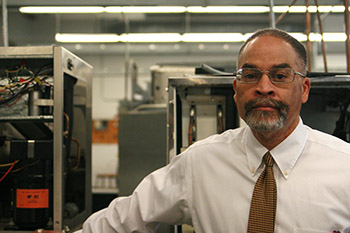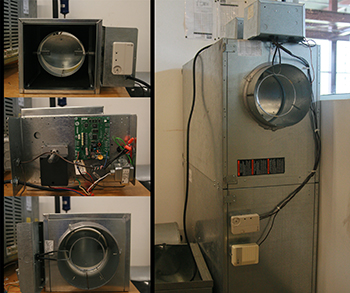Q&A: The Key Considerations for HVAC Systems
 As indoor air quality continues to be a major concern for health care facilities, HealthCare + Construction Operations News spoke with George Donaldson, HVAC Lead Instructor for Coyne College in Chicago, about the key issues to consider when installing an HVAC system at a health care facility.
As indoor air quality continues to be a major concern for health care facilities, HealthCare + Construction Operations News spoke with George Donaldson, HVAC Lead Instructor for Coyne College in Chicago, about the key issues to consider when installing an HVAC system at a health care facility.
Q: How have you seen HVAC systems evolve over your years working in the profession?
Donaldson: For the most part, Ive seen an evolution of digital control systems where you have controllers that are capable of measuring real-time data and giving information in the form of feedback to personnel that need to use it. The field has become digitalized with regard to how energy is managed and with regard to adjusting to offset conditions that determine how individuals can feel at any given point in a commercial building. There has also been an evolution of variable frequency drives technology and reset control features that give the boiler/chiller duty ratings, and they can also compensate for a lull in duty or an increase in duty ratings. Basically, the role of digital technology in the HVAC industry has expanded how controllers are achieved in a commercial building. This new technology can not only help the HVAC industry but also local contractors as well, with some plumbing companies that deal with HVAC and heating services looking to become more technologically capable in order to provide a more professional service.
Q: What are some key things to consider before installing an HVAC system in a health care facility?
Donaldson: The biggest concern would be following the Joint Commission for the Accreditation of Health Care Organizations (JCAHO) standards because they determine the template whereby an HVAC system is going to be installed with respect to energy management, with respect to feedback, with respect to providing a certain level of filtration, because indoor air quality is a really big concern for health care facilities. For example, I know through my research that about 90,000 people die each year because of nosocomial illness, which has a direct link to HVAC systems that are not properly maintained. Its about knowing the JCAHO standards and being able to communicate those standards to the personnel responsible for maintaining the HVAC equipment, or at least then be able to get in touch with a team similar to this hvac Denver company in order to communicate effectively with what the systems issues are..
The other thing is making sure that the engineer that repairs and installs the equipment is aware of the standards as well. Usually information is highly centralized in an organization and only a few folks at the time really know about the administrative standards when engineering personnel should be privy to those standards also. I think it would be better if there was better collaboration between management and the individual doing the actual job.
Q: What are some of the key issues that arise from installing an HVAC system, and how can those issues be solved?
 Donaldson: One of them has to do with lack of oversight and accountability. The other has to do with costs and budgetary constraints because with an HVAC system, it really depends on the application and whether the HVAC system is for surgery, critical care or a clerical kind of intervention. HEPA filters are by far the most efficient with regards to indoor air quality, but they are expensive and there are also key areas in a health care facility that dont require HEPA filters, so theres a conflict of interest regarding cost and availability of resources. The best plan would be to have a HEPA filter regiment or initiative throughout the whole organization, but its not always practical.
Donaldson: One of them has to do with lack of oversight and accountability. The other has to do with costs and budgetary constraints because with an HVAC system, it really depends on the application and whether the HVAC system is for surgery, critical care or a clerical kind of intervention. HEPA filters are by far the most efficient with regards to indoor air quality, but they are expensive and there are also key areas in a health care facility that dont require HEPA filters, so theres a conflict of interest regarding cost and availability of resources. The best plan would be to have a HEPA filter regiment or initiative throughout the whole organization, but its not always practical.
Q: What is trending in terms of HVAC systems?
Donaldson: It goes back to the direct digital control (DDC) systems. When you install a DDC system, it gives the owners and operators feedback as well as the engineers feedback about temperature, humanity and pressure in a real-time perspective or historical perspective that provides insight about how the system is being managed. It also gives them an idea of what systems should be retrofitted or upgraded or taken out and replaced all together.
Q: What other piece of advice do you have for someone installing an HVAC system?
Donaldson: The key for any owner, operator or contractor is having an alignment with the engineers that will maintain the equipment. Theres often a disassociation between what the contractors and design engineers install and how that equipment is made accessible to the engineers. There are certain roadblocks that impede an engineers ability to maintain the system. Those issues could be worked out prior to the installation or the repair or whatever is going to take place in that commercial building. It is best to have more collaboration and encourage the use of communication standards that will allow everybody to be on the same page regarding the units or systems being installed for customer service.
